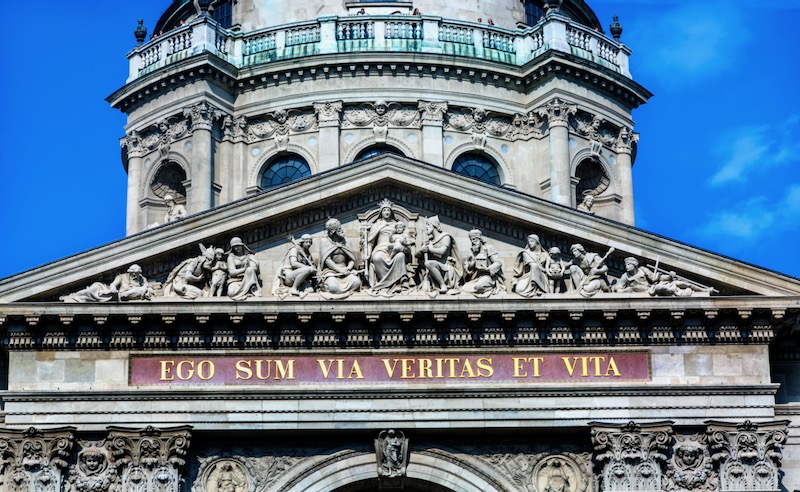We in the West think of truth in essentially impersonal terms: it is a property of propositions, expressed in words, written or spoken. We tell the truth.
But the ancient Hebrew notion was different: truth is first and foremost a personal quality, whose cognates are integrity, faithfulness, reliability and, above all, trustworthiness. The truth is where you walk, where you conduct your affairs, as well as what you say. In the Old Testament, it’s spoken of as one of the defining characteristics of a good person. Importantly, though personal, the Hebrew notion of truth was not relativist. ‘My truth’ or ‘true for me’ would have been as incoherent as it is ungrammatical. The New Testament concept of truth, the Christian concept of truth, brings together this Hebrew and our Greek notion of truth. The truth is discovered or disclosed, not invented, and certainly not self-generated.
But equally, it is not necessarily where we start out from but where we hope to arrive. In this sense, the truth points us both to our origin and our destiny. At the core of the New Testament is the conviction that God, our origin and destiny, has spoken his Word of Truth in the person of Christ. He has uttered his divine word in a ‘language’ accessible to us humans, in the person of Christ, in another human person, the Word made flesh. The trustworthiness of this truth that encompasses all truths, is absolute: in this truth, uniquely we can place our entire trust. But far from being a simplistic certainty, this truth is more challenging than any other. We’re called not merely to parrot the truth but to live it: we do the truth with our deeds, just as much as we tell the truth with our words. “What I do is me”, as Gerard Manley Hopkins has it (As Kingfishers catch fire). Harmony between head, hand, and heart secures our integrity.
Truthfulness and trustworthiness are, of course, indispensable conditions of civilised existence. Flagrant disregard for the truth begets personal, social and political chaos. When we don’t mean what we say or when we habitually say what we don’t mean; when promises are glibly made and casually broken; when language and speech are used to distort and disguise, we lose our way, society implodes, hearts are broken and lives destroyed. But truthfulness, whether in word or deed, is impossible without acceptance of our true selves, becoming that self we are called to be in virtue of our origin and destiny. Being true to ourselves, as Shakespeare so aptly reminds us in Polonius’s parting advice to his son, is the only way we will be truthful to others: …to thine own self be true, And it must follow, as the night the day, Thou canst not then be false to any man.
Of course, there’s much that militates against accepting and being our true selves. The pressure to conform, greater and more insidious than ever before, generates one of the main sources of untruthfulness, namely fear: fear of what others think of us, fear of ridicule or rejection, fear of criticism and censure; worst of all, fear of failure. But failure is our friend. How else do we become human and humane, except in solidarity with the failings and failures of all other human beings? Our lives are laced with failure: failure is part of our fallen condition. The acceptance of failure is the first, indispensable step towards sanctity, Herbert McCabe somewhere says. It was by the acceptance of failure (from the world’s point of view) on the Cross that we were redeemed. Telling the truth is, of course, not always easy: anyone who says it is, is not telling the truth or is lacking in self-awareness. It can be daunting to speak the truth, not just to power, but even to those with whom our lives are most closely intertwined.
Yet the imperative to tell the truth is as vital as the need to hear it: our understanding is always ripe for revision. But ease of communication and the torrent of information that surrounds us make it all the more important to be respectful rather than merely artful users of words. And that may mean saying less rather than more. When it comes to telling the truth, silence is as important as speech. Saying nothing is sometimes the only truthful course of action. In all things, our model is Christ, the Word made flesh, whose truthfulness shone through everything he said and did. His words were sometimes hard, sometimes comforting, sometimes challenging, and sometimes moving; but they were always truthful and trustworthy. He never wounded with his words but neither did he ever flatter. His truthfulness provoked protest, opposition and, ultimately, cost him his followers, his friends, and his life. But he, the Truth, redeemed us and freed us for friendship with God and one another for all eternity.
Come, my Way, my Truth, my Life: Such a Way, as gives us breath: Such a Truth, as ends all strife: Such a Life, as killeth death. Come, my Light, my Feast, my Strength: Such a Light, as shows a feast: Such a Feast, as mends in length: Such a Strength, as makes his guest. Come, my Joy, My Love, My Heart: Such a Joy, as none can move: Such a Love, as none can part: Such a Heart, as joys in Love. George Herbert (1593-1633).



 Loading ...
Loading ...
What do you think?
You can post as a subscriber user ...
User comments (0)